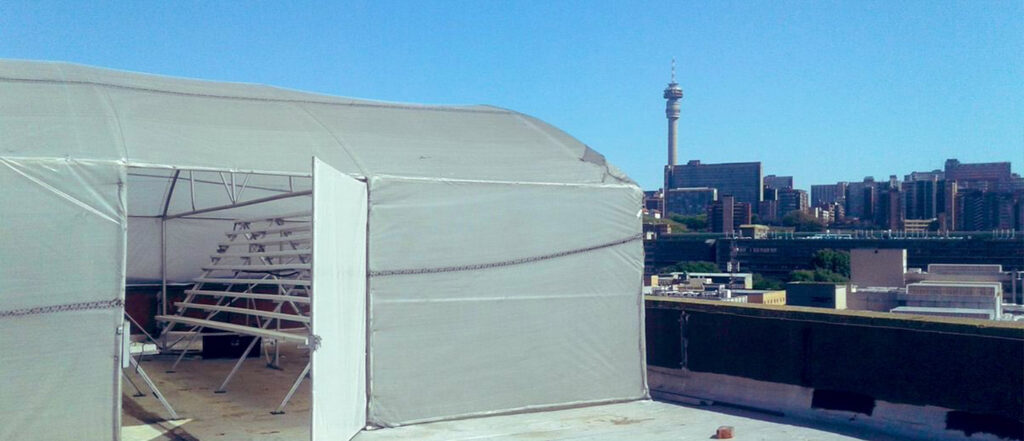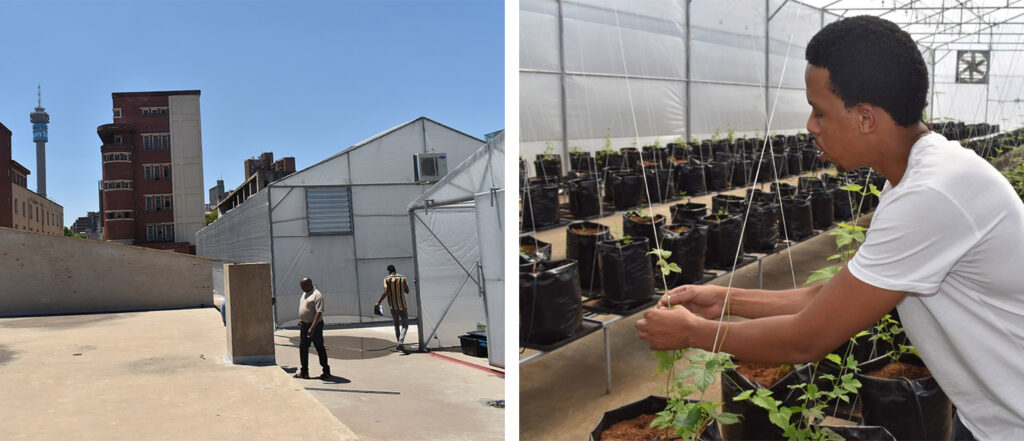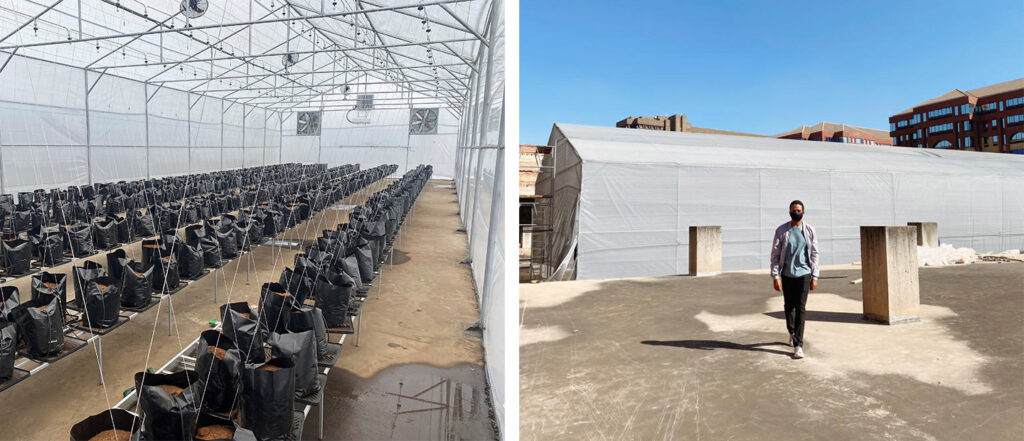A young farmer called Khaya Maloney is doing an astonishing thing. With the assistance of the Urban Agriculture Initiative (UAI), a spin-off project of the open innovation, idea and business incubator ‘Wouldn’t It be Cool’ (WIBC), Maloney is growing hops on the roof of a building in downtown Johannesburg.
It’s not only fascinating that the crop is thriving in an urban setting, but also that someone is growing hops there at all. Traditionally hops is grown near George in the Western Cape. Conditions there are perfect for this plant this fruit is the signature ingredient in beer. Finding it on top of the building in the Maboneng district in Gauteng is manna from heaven.
Khaya Maloney’s project is fabulous news for the craft brewing industry in this country. To date most of the hops used in the local craft industry had to be imported. This is because South Africa’s biggest brewing concern has cornered the hops market and strictly monitor its growing and distribution. A few independent farmers had started growing new strains of hops, but this was a drop in the ocean.
Now there’s a young agricultural entrepreneur shooting the lights out by growing this sought-after ingredient by the ton on the roof of the Constitution Hill building in Braamfontein. More than just growing it, his climate-controlled, hydroponic operation is producing multiple annual crops which is unheard of for the traditional growers in the Cape.
Maloney approached WIBC with his idea grow the hops in a hydroponic system. The incubator has a particular passion for helping to create impactful and sustainable businesses where problem solving approaches are used to create concepts that grow into viable and lasting companies. So his hops project fit the bit perfectly.
The Urban Agriculture Initiative(UAI) division of WIBC exists specifically to remove the critical barriers preventing newcomers from entering the agriculture ecosystem. These hurdles include access to land, training, funding and market. Project co-ordinators leverage modern technology to create a competitive advantage for small footprint agriculture production, allowing them to be more responsive to the needs of the market.
Maloney’s hops project, called Afri-Leap, had some challenges that required smart interventions. For instance, the hops farms in George receive up to 18 hours of sunlight in the growing season. The farms, set back from the coast at the top of the Outeniqua Pass between George and Uniondale also enjoy cooling winds and a very high annual rainfall. Replicating these conditions was a major hurdle, but one UAI was equal to.
Their answer was to supplement the conditions with growing lights, fans, pulsators and a water pump system that switches on every four to five hours. With this set-up Khaya Maloney is able to harvest hops four times a year. It didn’t come cheap though. The UAI found the funding he needed and with their innovative approach to sweating the assets with multiple harvests, the project is reaping rewards.
The ‘farm’ is closer to its customers, so distribution is swift and efficient. New consumers were also found in the form of restaurant chefs who buy much of the crop for culinary use – especially for flavouring steaks. Extraction of essential oils also created another revenue stream. Selling smaller parcels of produce to many users, rather than an entire crop to a single brewer means much better profits.
Actually growing the hops was no the only challenge Maloney had in setting up Afri-Leap. He needed rhizomes from which to propagate his initial plants. As the rights and patents to most locally grown hops variants are owned by the dominant South African corporate brewer, he faced a bit of a struggle. The UIA assisted in finding a farmer who grew licensed, patented rhizomes. The fledgeling hops farmer was then guided and assisted in the process of gaining his own licence.
During the entire process of building the Afri-Leap hops farm, lessons were constantly being learned. The shorter growing cycles of hydroponic systems, the ability to harvest as many as four crops a year, the water conservation potential and innovations around realising value from the crop have been applied in a new hydroponic project championed by WIBC and UAI.
Mila Fresh, the retail arm of UAI, which helps the programmes’ entrepreneurs with access to market is now launching a hydroponic mini-unit that can be used in households. It will come with a step by step manual that will enable people in crowded urban setting to grow raise a garden in their own kitchens
With staggering rates of unemployment in South Africa, the hydroponic mini-unit provides another opportunity. Agricultural development is a viable means to create sustainable employment, as evidenced by the hops project. Encouraging young people to use the hydroponic systems to specialise in cash crops that can be grown in congested urban settings where space is limited but access to market is bountiful.
Government currently lacks the capacity to support all agricultural development in the country, so any innovation in this arena depends on partnerships between the private and public sectors. Organisations such as WIBC and their subsidiaries (such as the UAI), are instrumental in opening the agricultural sector to the youth, or emerging farmers.
With the knowledge and expertise that entrepreneurs such as Maloney have gained from the programme, he can go on to empower and equip new farmers. For the sake of the environment and healthy communities, the sustainable future of food crop production belongs to micro-producers, growing produce where it is needed.
Rooftop food gardens and hops farms in the sky are a start, but they are only one component of the broader vision of ‘Wouldn’t It Be Cool’. Working with the dreams and aspirations of people like Khaya Maloney, WIBC is creating skills and capacity for job creation among urban youth.
To purchase hops, email Khaya Maloney on maloneykhaya@gmail.com and for information on UAI and how you can be part of the programme email farming@wibc.biz .



